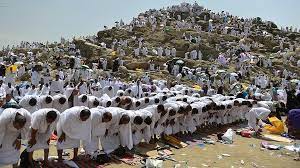
This year’s Hajj pilgrims reached Jamarat Bridge on Wednesday as they advanced through Mina for the final rite, the stoning of the devil, on the first day of Tashreeq.
About 2 million pilgrims made their way to the massive multistory complex in Mina from Muzdalifah, where they had camped overnight. After dawn (Fajr) prayer they carried out the ritual, which involves throwing 21 pebbles at the three large columns.
It is here that Muslims believe the devil tried to talk the Prophet Ibrahim out of submitting to God’s will.
Traditionally, seven pebbles are thrown at a post representing the devil. But since 2004, it has been replaced by walls to accommodate the rising numbers of pilgrims.
Security guards sprayed the pilgrims with water as they braved the searing heat to reach the Jamarat complex. This year’s Hajj pilgrimage has seen temperatures as high as 45 degrees Celsius.
The huge crowds lined up to perform the rite, many holding umbrellas to shield themselves from the sun. Clad in the ihram — a seamless pieces of white cloth — the pilgrims said, “Allah-u Akbar” (“God is the greatest”) each time they cast a pebble.
The ihram symbolizes equality, religious unity and pursuit of spiritual renewal.
Hamoon Naimi, a pilgrim from Afghanistan, told Arab News: “This is my first trip to Saudi Arabia. Jamarat is very busy but I did my rite. Hajj is the fifth pillar of Islam and I enjoyed it.”
Ahmad Zia, from Canada, said: “Today is a good day as a Muslim to complete four phases of the Hajj at Mina, Arfat, Muzdalifah and Jamarat.
“I came from Arafat to Muzdalifah and to Mina. I hit the big devil at Jamratul Akbar, will do the sacrifice, then cut my hair and change my cloth. The next day I will come back because this is the history of Prophet Ibrahim.”
Indian pilgrim Mohammad Salim Basha said his experience at Jamarat was “very pleasant” and that he hoped to return to Makkah next year for the Hajj.
After finishing the stoning of the devil ritual, male pilgrims traditionally shave or cut their hair and change out of their ihram. Women cut a lock of their hair.
The pilgrims then return to Makkah to do Tawaf, the circumambulation of the Kaaba.
Hajj lasts for five days and officially begins on the 8th of Dhul Hijjah, soon after the dawn prayers, which are performed in Makkah. The pilgrims then travel to Mina, which is about 8 km away.
They spend the day and night in Mina praying, reciting verses and praising the Almighty. They then make their way to Arafat and on to Muzdalifah, where they spend the night out in the open and gather pebbles for the stoning ritual.
After dawn prayers on the 10th of Dhul Hijjah, the pilgrims leave Muzdalifah and proceed to Jamarat, where they stone the three pillars representing the devil. Women and older pilgrims can delegate this responsibility to a male in their spiritual journey.







